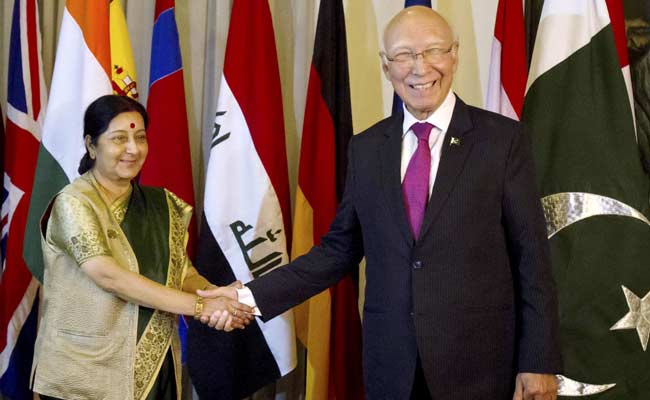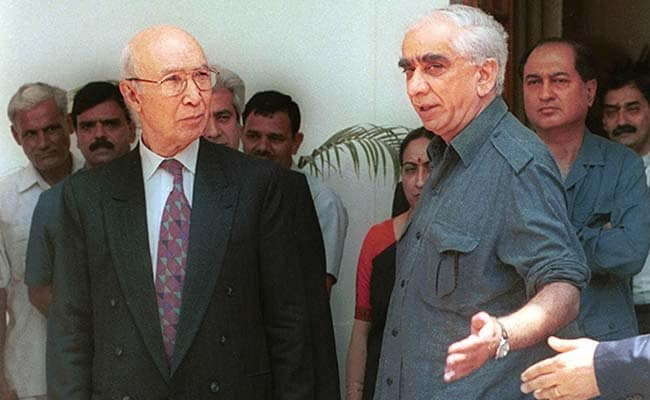Thus, Sartaj would find it a bit deja vu if Modi and his team were to give him the cold shoulder when he fetches up in Amritsar on December 3 for the annual Heart of Asia conference. Our Foreign Office spokesman, in an unusually blunt statement, has let it be known that such indeed is the treatment being readied for Sartaj: "It would be better to woo Pakistanis to end his government's policy of state sponsorship of terror" as "talks and terror cannot go together".
Sartaj, for his part, is only too willing to take it on the chin because he knows that this will only reinforce the point he is making to the world by coming to Amritsar at all. First, he wants the world to know that, in sharp contrast to India, Pakistan is not in the game of tit-for-tat diplomacy. For where India sabotaged the SAARC meeting that was to have been held in Islamabad earlier this month, Pakistan is intent on demonstrating that it is a "good South Asian" in searching for solutions to Afghanistan (however distant the prospect), which is the purported purpose of the Amritsar conference. Ironically, it was at precisely this same conference in Islamabad in December 2015, a year ago, that Sushma Swaraj and Sartaj Aziz signaled the thaw in the India-Pakistan freeze that led to Modi, a few weeks later, dropping in dramatically on Lahore to say "Happy birthday" to Nawaz Sharif on Christmas (sorry, I mean "Good Governance Day"!)
Sartaj wants to emphasize to world opinion that Pakistan is willing and eager to talk to India and that it is India that is playing spoilsport.

External Affairs Minister Sushma Swaraj with Pakistan's Foreign Affairs Advisor Sartaj Aziz in Islamabad (File photo)
While, therefore, the world was with us when Sartaj was snubbed by Jaswant on his mid-Kargil visit to our capital, there is going to be little applause and less sympathy for India in the chancelleries of the world when we turn up our nose at Sartaj in Amritsar. India would be regarded as the stick in the mud while Pakistan gets away with the image of being both a warrior against terror and a party only too willing to settle matters through dialogue with India. Of course, it will be added that Pakistan really must do something about India-directed terror sprung from Pakistani soil, but Pakistan can take the reprimand in its stride because it would by then have made the point that it is a reasonable, responsible country, waiting for India too to become reasonable and responsible.
This is not a prediction. It is based on what has actually happened in the wake of Uri. Nawaz Sharif and US Secretary of State John Kerry met in New York immediately after Uri and it is their joint statement that I have paraphrased in the previous paragraph. The State Department and White House spokesman have reiterated this line in several subsequent statements, particularly in response to obstreperous Indian newsmen attempting to make their mark at official US press briefings.
The Russians too have endorsed that line. Not only did Russia continue their unprecedented military exercises with Pakistan after Uri, but Moscow is displaying its enthusiasm to match India's diversification from Russia of its defence purchases by finding a new market for its arms and equipment in Pakistan. The final quietus to India's former "time-tested relationship" with the Soviet Union/Russia was delivered by Putin to Modi at the Goa BRICS summit when he refused to endorse Modi's plea for strong words against Pakistan.
In line with Washington (and implicitly Moscow), other western capitals from London to Paris to Berlin, and, of course, Beijing, are echoing the perception that this is the time for India and Pakistan to not turn their backs on each other but sit down and hammer out an agreement, however long it may take. Indeed, Beijing points to its own dialogue with India that has gone through 18 rounds and is nowhere near conclusion, but has ensured two decades of relative peace and tranquility at the border with no incident getting too far out of hand. It is widely acknowledged that getting to the goal of a satisfactory via media might be long, arduous and perhaps Sisyphean, but they desperately want South Asia's two nuclear giants to engage and not accidentally take the Sleepwalkers'descent that led the West into the massacres of the First World War (followed inevitably by the Second) only because in 1914, intransigence was privileged over accommodation. Hence, however loud or sharp the world's condemnation of Pak-sponsored terrorism, their bottom line is that New Delhi and Islamabad must talk.

Pakistan's Sartaj Aziz and India's then Foreign Minister Jaswant Singh at Hyderabad House, New Delhi in June 1999 (Associated Press)
Were we to do so, we would find in Sartaj Aziz just the right kind of dialogue partner to carry conviction in Pakistan that he is furthering and not surrendering Pakistani interests in working towards an agreement with India. Consider his credentials in Pakistan: as a committed Leaguer since early youth, an avid follower of the Quaid-e-Azam, and a college propagandist for the Muslim League in the elections in Punjab in 1945-46, when the Muslim League was not the favoured party in Punjab, a hard-liner on Kashmir, an international civil servant of considerable renown, especially for his work with the Food and Agriculture Organization (FAO) in Rome, his performance as Finance Minster in previous governments, and his foreign policy expertise that has brought him a second term under Nawaz Sharif II - all this adds up to a reputation in Pakistan that he is a tough and committed cookie.
At the same time, Sartaj is no fan of the army. In his autobiography, Sartaj rues the role of the armed forces in decision-making: "This is a very sad reflection on Pakistan's governing structure,the civil-military relationship and the total absence of an effective infrastructure for decision-making on national security issues...Pakistan is in the ambivalent position of having an army that can neither govern nor allow civilians to rule." He will be arriving in Amritsar in the immediate aftermath of Nawaz having successfully seen off Gen. Raheel Sharif as Chief of Army Staff and brought in his place Gen Bajwa, selected over four others, we are told, because of Bajwa's much vaunted commitment to democracy and his desire to keep the army out of civilian affairs. Negotiations with Sartaj would thus carry conviction with hardliners in both civil society in Pakistan and with the Pak armed forces. The huge peace constituency among ordinary Pakistanis would, of course, be thrilled if talks were to commence.
This is an opportunity we must not miss. But, of course, we will miss it - for the Modi government, like authoritarians everywhere and at all times, finds the "othering" of Pakistan a politically fruitful exercise domestically. When Sartaj Aziz is brushed aside by India at Amritsar, Pakistan will win a few brownie points internationally; Modi will secure the same domestically on the eve of the upcoming UP and Punjab elections. The sub-continent will continue to tremble on the brink of disaster. "Happy New Year", anyone?
(Mani Shankar Aiyar is former Congress MP, Lok Sabha and Rajya Sabha.)
Disclaimer: The opinions expressed within this article are the personal opinions of the author. The facts and opinions appearing in the article do not reflect the views of NDTV and NDTV does not assume any responsibility or liability for the same.


